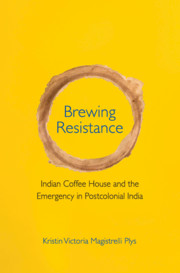Book contents
- Frontmatter
- Contents
- Acknowledgements
- 1 Introduction
- 2 How Anti-Colonial Labour Movements Create Anti-Authoritarian Autonomous Zones
- 3 Indira Gandhi’s Political Economy of Development
- 4 Social Movements of the 1970s
- 5 Emergency at Midnight
- 6 The Coffee House Movement
- 7 ‘Coffee House’ Workers’ Anti-Colonial Labour Movement
- 8 Conclusion
- Appendix I Photographs
- Appendix II Political Parties during the Emergency
- Appendix III Methodological Appendix
- Bibliography
- Index
8 - Conclusion
Published online by Cambridge University Press: 12 May 2020
- Frontmatter
- Contents
- Acknowledgements
- 1 Introduction
- 2 How Anti-Colonial Labour Movements Create Anti-Authoritarian Autonomous Zones
- 3 Indira Gandhi’s Political Economy of Development
- 4 Social Movements of the 1970s
- 5 Emergency at Midnight
- 6 The Coffee House Movement
- 7 ‘Coffee House’ Workers’ Anti-Colonial Labour Movement
- 8 Conclusion
- Appendix I Photographs
- Appendix II Political Parties during the Emergency
- Appendix III Methodological Appendix
- Bibliography
- Index
Summary
I rebel—therefore we exist.
—Albert Camus, The Rebel
In the mid-twentieth century, the Third World was charged with the optimism of decolonisation and national liberation movements that sought to radically transform postcolonial societies. But by the 1970s, authoritarian regimes had in many instances replaced national liberation politics. The very movements that had seemed so full of possibility had tipped into political repression. The many social movements in India leading up to the Emergency (1975–7) facilitated social protest during what became a political turning point. The Coffee House Movement (1975–6), which was a particularly important zone of resistance to the Emergency, provides key insights into the aftermath and legacy of social protest in the 1970s and how it contributed to the restoration of democracy in India.
In the first part of the book, I examined the various social movements in India during the late 1960s and early 1970s that pushed the postcolonial state to enact the social justice that decolonisation promised but had yet failed to deliver. Indira Gandhi claimed that the threat posed by these movements warranted the revocation of civil rights, and, ultimately, the revocation of democracy itself. Indira Gandhi's vociferous opposition to these movements, I argued, was, at one level, her strategy to maintain extra-legal power after the Allahabad High Court Ruling that barred her from holding office, but, on another register, was her way of executing a new strategy for India's economic development in the face of widespread opposition from social movements. In this part of the book, I drew on newly available archival materials to analyse the pre-Emergency development policies of Indira Gandhi, who was first elected prime minister in 1966. Also through archival sources, I looked to the many social movements that emerged in the early 1970s, partly in reaction to Indira Gandhi's economic and social policies, including the Dalit Panther Party, the Bihar Movement, and the Railway Workers’ Strike, to better understand the social implications of these new policy programmes. I then situated the events of the Emergency in the context of these conflicts over development policy and its adverse social outcomes, thereby setting the scene for the Coffee House Movement.
- Type
- Chapter
- Information
- Brewing ResistanceIndian Coffee House and the Emergency in Postcolonial India, pp. 289 - 298Publisher: Cambridge University PressPrint publication year: 2020



